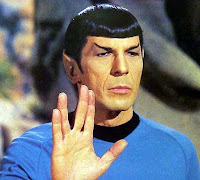As a postscript to my last post, I notice that Richard Gipps has a further entry which questions a very close link - I may have been more explicitly keen to make in the pub than in print - between understanding and rationality. This link is called into question especially in cases of psychopathology where the idea of understanding an action or utterance being a matter of placing something in a rational pattern can seem to be put under threat. He comments:
Whilst one of the aims of understanding might be rational comprehension... what about other such forms - such as making something empathically intelligible, or symbolically (in the psychoanalytic - displaced association - sense) or emblematically (in the phenomenological - ontical emblem of an ontological disturbance - sense) intelligible? Might these not still be available to us - when we are trying to make sense of psychotic delusion - even when the project of rendering a delusion rationally intelligible has given out? Might not the equation of rationality with understanding amount to a prejudice of analytical philosophy, rather exclusively concerned as it is with rational argument; might we not have here a kind of illicit projection of philosophy's own methods back onto its subject matter, and an exclusive if unwitting focus on its own parochial concerns?
He then goes on to say two further things. First, rational judgements cannot be limited to those ‘supportable by reasons - as something which could be justified’ because judgements, such as inductive judgements, can exemplify rationality without being justified eg. by a claim about things carrying on in the same way. Second, there are a variety of cases where ‘understanding’ seems right but ‘rational’ is odder such as musical understanding or the understanding of a practical technique.
Now there is a substantial philosophical literature on reasons with which I’m insufficiently familiar. (Funny how in philosophy there can be a debate which is adjacent to one’s own concerns but can seem very strange and unfamiliar.) But this is what I’d say over a pint (if not be rash enough to write down).
First, although familiar regress arguments suggest a limit to the hierachy of reasons that might be involved in empirical judgement (it isn’t ‘turtles all the way down’, eg.), it would be odd to think of individual inductive judgements as not supportable by reasons: the particular reasons are what, in particular, has been observed in the past. (To take Hume’s example, I may judge that this loaf of bread will be nourishing, rather than mere supermaket cotton wool, because this is what I have found in the past, even if I do not need to add that correlations that have held in the past will hold in the future.) So I think I am happier with the connection between rationality and being supportable by reasons than Richard thinks I ought to be. What we need to beware of is a view in which there is always something more to be said for how a reason is a reason for something, a move to a higher level principle (such as that correlations that have held in the past will hold in the future). In both inductive and deductive cases that certainly looks to cause problems.
Second, it does seem to me to be natural to say in many, at least, aesthetic cases as well as practical cases that there are reasons in play (in the latter case, as in fact Richard himself suggests). So one moves the plaster like this! in order to produce this! effect. It must be mixed to this! degree of moistness for the final result to dry like this! But also if one understands why this! is the right musical coda then, perhaps, one can contrast it with this! chord. (I am drawn to the idea that aesthetic appreciation is always a matter of understanding and thus always a matter where reasons are in play but I realise that there are cases – eg Rothko - which challenge this because of the paucity of the available reasons.) Anyway, if one’s understanding is supportable by reasons it seems natural to say it is a species of rational understanding. (What blocks that may be the thought that rationality has to be apportioned to Spock and not Bones whilst affective responses belong to Bones but not Spock. No, rationality embraces both and so belongs to Kirk!)
But why think that the link understanding and rationality applies generally in the first place? Two reasons: there is Davidson’s argument for the link based on the idea of radical interpretation. That argument has come under fire from two important directions (that principles other than the principle of charity are sufficient for understanding; and that the assumption of rationality is undermined by empirical considerations). But my hunch is that, providing that the link is not thought of as reductive (so that we are owed an account of rationality in interpretation-independent terms), those can be accommodated even if that reduces the explanatory link we might have thought to find in Davidson.
Second, I am persuaded by the idea that intentional states are normative. The Brandomian idea of undertaking commitments seems helpful. And thus charting intentional states and their expression is charting a normative network of reasons.

